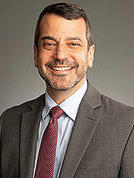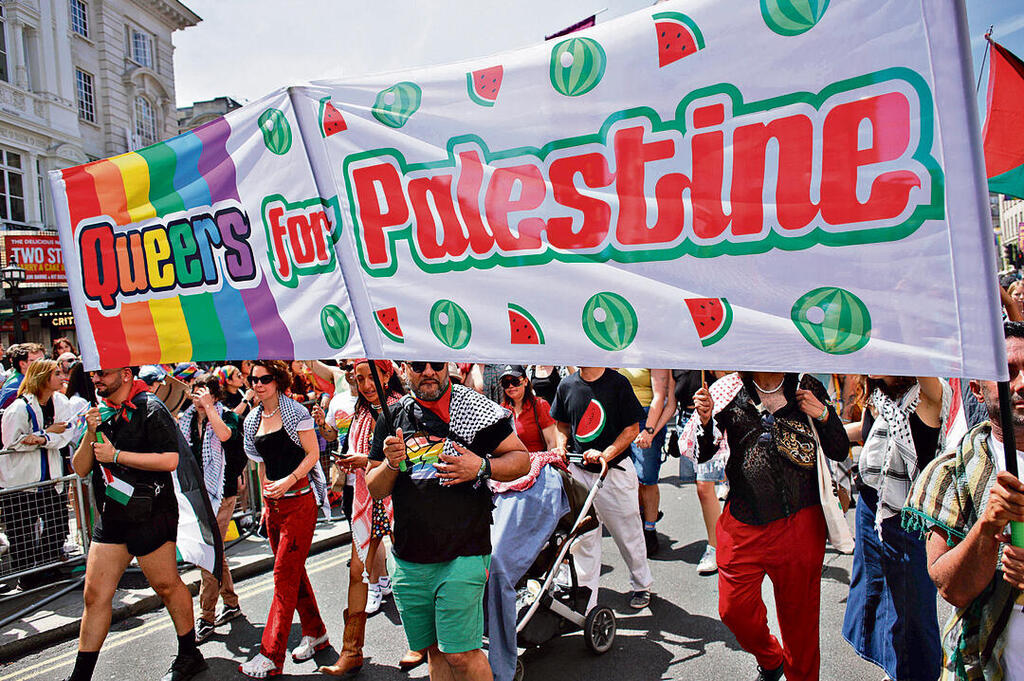Getting your Trinity Audio player ready...
Usually, for hundreds of thousands of LGBT Jews around the world, Pride Month is an annual peak event, a time of self-expression, of completion and a sense of belonging. An opportunity to turn to the world and say: I'm Jewish, I'm LGBT, accept me as I am. But this year, in the shadow of the war and the disturbing increase in antisemitism specifically in the liberal groups, this important month was especially scary.
America, the "Golden Medina", which was considered for decades the safe haven for Diaspora Jews - has become a scary place for LGBT Jews. In a country where 11 percent of Jews define themselves as gay, lesbian or bisexual, it seems that the environment is no longer as safe as it used to be.
“We're all afraid of the situation," says Ethan Felson, Executive Director of A Wider Bridge, one of the largest LGBT Jewish organizations in the US, when I asked him about violence against LGBT Jews after October 7. But he does not intend to surrender: "We marched in parades with Pride, because no one can take away our Pride. They tried, and failed. True, there were people who mocked Jews and supporters of Israel at Pride events, just like they did on college campuses. This is a campaign aimed to intimidate LGBT Jews. There is antisemitism is embedded in it, but we didn't let them win."
According to Felson, contrary to the images seen in Israel, the increase in anti-Zionism and antisemitism in the American gay community is no different from what is seen in the rest of the American population: "LGBT leaders in more than 100 cities supported our fight against antisemitism in the queer community. There is an increase in antisemitism in many sectors, and it impacts LGBTQ people too. But as a community, LGBTQ people reject the notion of Jews as 'oppressors' the same as non-LGBTQ people reject it. Although LGBT people belong more to the progressive camp, they don't associate 'oppression' specifically with Jews, and neither does the general public. However, there is a minority of anti-Israel activists in the gay community, and they make noise."
 Ethan Felson
Ethan FelsonFelson explains that the strength of this group is actually its size: "One of the most powerful tactics in public relations is that of the “surprising validator.” When support for Hamas comes from queer groups, it is implied that the gay community is anti-Israel - which it is not. It's a fringe, but because it comes from within the progressive camp, it is a very powerful voice."
How do you explain the pictures of queers with Keffiyehs?
"Do you know the term cosplay? (People who dress up as characters from anime series - OC). It's a Keffiyeh-cosplay. It is part of the rise in antisemitism. And it is magnified by the normalization of the use of the term 'Zionism' as a pejorative. This is one of the biggest challenges since October 7 - the replacement of Jews with 'Zionsists', and the use of 'Zionsists' as a 'safe' way to insult Jews. You are not considered antisemitic if you use 'Zionsists' instead of 'Jews.' This is pervasive on the left in America today. The LGBT community is a few clicks to the left of the non-LGBT community, so we feel it a little more."
“We're all afraid of the situation," says Ethan Felson, Executive Director of A Wider Bridge, one of the largest LGBT Jewish organizations in the US. "This is a campaign aimed to intimidate LGBT Jews. There is antisemitism is embedded in it, but we didn't let them win."
In addition, according to Felson, the (Israeli) government has an influence on this narrative: "We have heard from many LGBT leaders in America that government ministers who oppose the LGBT community have tarnished Israel's reputation as a safe place for the gay community. It is difficult for them to separate this from their understanding of the State of Israel as a whole."
Felson points to an anomaly in American society: precisely when the gay community in the US is in danger, the handful of noisy activists focus on Israel: "In a year with more transphobic legislation than we've ever seen - they're busy supporting those who support throwing LGBT people off rooftops. Where would you rather go to a gay rooftop party Tel Aviv, or Gaza?".
Did you receive specific threats?
We have heard from many people who received hateful comments. An organizer of a large LGBT event was attacked online because he’s a Zionist. People have used a language of hate. In Pride events this year, there were signs like “no pride in genocide”, shirts that said “stop settler colonialism”. But it’s not just that: this Pride month we had to worry about foreign terrorist organizations and their supporters bringing harm to Pride - along with lone wolves. (The FBI and Department of Homeland Security issued a warning about this.) There are enough people who want to take our Pride away.
However, Felson points to a bright spot: the support from the Jewish community. "We’ve had amazing support. For example, numerous organizations - including the Conference of Presidents, Jewish Federations of North America, the American Jewish Committee and the Anti-Defamation League - and many others forwarded a letter with our concerns and requests to Congress calling for security for LGBT Jews."


